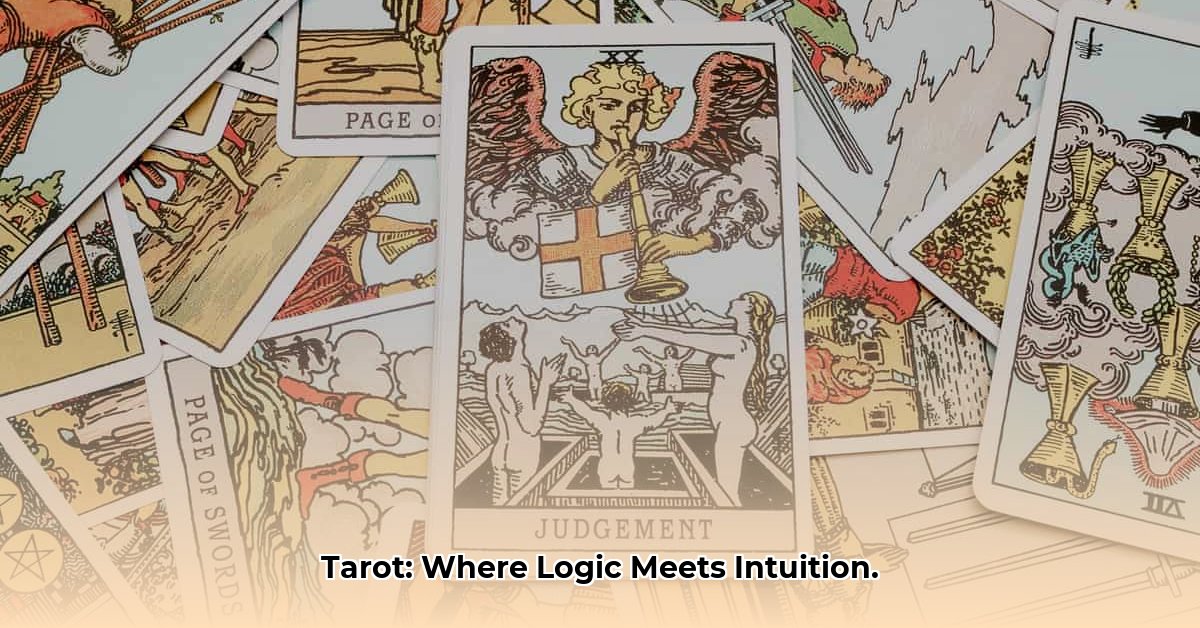The Heart and Mind in the Tarot: Exploring the Judgement Card
Ever feel like your head and heart are at odds, especially when facing a big decision? We all grapple with the interplay of logic and emotion, and it’s not always easy to see how feelings influence our choices. This guide explores this dynamic through the lens of the Tarot’s Judgement card. Whether you’re a Tarot enthusiast or simply curious about self-awareness and personal growth, this exploration offers insights into navigating life’s complexities.
Judgement: Beyond Logic, Embracing Emotional Intelligence
We constantly evaluate everything around us, forming judgments that feel purely rational. Yet, our emotions play a significant, often unrecognized, role. Imagine your friend cancels dinner plans last minute. Do you logically assess their excuse, or does a tinge of disappointment color your perception? This interplay between reason and emotion is the essence of “judgement as feelings.” It’s recognizing how our inner world shapes our interpretations, particularly in relationships.
The Judgement Card: An Emotional Awakening
In Tarot, the Judgement card symbolizes this inner process. The traditional image of an angel’s trumpet call and rising figures represents not a literal resurrection, but an emotional one. It prompts us to confront buried feelings, acknowledge past mistakes, and reach a new level of understanding. It asks: Am I seeing clearly, or are past hurts and biases clouding my judgment?
Upright Judgement: Clarity and New Beginnings
When upright, the Judgement card often suggests a breakthrough in understanding. In relationships, this could mean a deepening connection, newfound honesty, or closure in a past relationship. It’s like hitting “reset” on emotional connections, fostering a fresh start.
| Upright Judgement | Relationship Implications | Example |
|---|---|---|
| Clarity | Deeper insights into motives and feelings. | Understanding your partner’s distance stems from work stress, not relationship issues. |
| Awakening | Recognizing recurring patterns. | Becoming aware of your defensiveness in arguments and choosing empathy instead. |
| Renewal | Embracing new beginnings and forgiveness. | Letting go of past grievances, allowing a friendship to blossom anew. |
Reversed Judgement: The Shadow of Denial
Reversed, the Judgement card suggests resistance to this awakening. Denial takes hold, leading to self-sabotage. This might involve ignoring red flags, refusing to acknowledge personal responsibility, or blaming others. It’s like ignoring the elephant in the room, leading to stagnation and missed growth opportunities.
| Reversed Judgement | Relationship Implications | Example |
|---|---|---|
| Denial | Avoiding difficult truths. | Ignoring your partner’s requests for quality time, pretending all is well. |
| Stagnation | Resisting necessary change. | Staying in a relationship that no longer serves you, fearing the unknown. |
| Self-Sabotage | Hindering growth and connection. | Picking fights when things are going well, driven by a fear of intimacy. |
Living with Judgement: Integrating Head and Heart
Applying the Judgement card’s wisdom begins with self-awareness. Before jumping to conclusions, pause and ask: “Is my reaction objective, or is it colored by my emotions?” This mindful inquiry can shift perspectives and transform interactions. Perhaps what seemed like a slight was miscommunication, or your partner’s behavior reflects their own struggles. Judgement encourages seeking understanding, reminding us that clarity—both emotional and intellectual—is the bedrock of healthy relationships.
Decoding Judgement: Exploring the Emotional Landscape
Beyond symbolic interpretations, what does Judgement feel like? It can be intense, like self-reflection after a major life event. It’s not about external judgment, but an internal audit, acknowledging past choices and their impact. It prompts questions like: What parts of myself have I hidden? What dreams need resurrecting?
Judgement is less about criticism and more about self-assessment. It’s about understanding, not condemning, past mistakes. It encourages reflection: Do my actions reflect my values? Have I been true to myself? This isn’t a harsh critique, but a gentle nudge towards alignment.
Upright Judgement often signals awakening or increased self-awareness. It could be a sudden insight, a gradual realization, or a renewed sense of purpose. This awakening can bring liberation, forgiveness, and hope.
Reversed Judgement may suggest unresolved self-doubt and resistance to truth. It’s like hitting “snooze” on an internal wake-up call. This can lead to stagnation and inner conflict, potentially manifesting as self-criticism, regret, or fear of failure. Even in these challenges lies potential for growth.
Surrounding cards in a Tarot spread provide context. Judgement alongside the Lovers might suggest a relationship decision point. With the Eight of Swords, it could indicate breaking free from limiting beliefs. These pairings add nuance.
Applying these insights can involve journaling. Reflect on your emotional responses to Judgement’s imagery. What resonates? What needs re-evaluation? Meditation can also deepen understanding. Ultimately, Judgement invites us to embrace change as an opportunity for growth.
Remember, Tarot interpretation is often subjective. These are possibilities, not definitive answers. Ongoing dialogue within the Tarot community encourages further exploration.
| Upright Judgement | Reversed Judgement |
|---|---|
| Awakening | Self-Doubt |
| Liberation | Stagnation |
| Forgiveness | Self-Criticism |
| Renewal | Regret |
| Clarity | Fear of Failure |
This table summarizes potential emotions associated with Judgement. The true significance depends on context and intuition.
How Feelings Shape Our Judgements
Our feelings profoundly influence our decisions. Anger might lead to regrettable words, while anxiety can prevent us from taking chances. Emotions act like filters, shaping our perception and reactions. Understanding this “emotional lens” is key to making informed choices.
Our judgments are steeped in emotional responses. The joy of success and the safety of familiarity are powerful advisors, sometimes leading to opportunity, sometimes to dead ends. Navigating this emotional landscape is crucial for sound judgment.
The Judgement card offers a helpful analogy. It’s about reflecting on past choices and looking ahead. It reminds us to check in with our intuition: Are we listening to inner wisdom, or are past experiences clouding our judgment?
Upright Judgement is a wake-up call, suggesting readiness for growth. Embracing a new opportunity despite fear exemplifies how positive emotions can lead to positive outcomes.
Reversed Judgement often signifies ignoring our inner voice, perhaps avoiding difficult truths or clinging to old habits. Continuing a failing project due to sunk cost is an example of emotions overriding logic. Recognizing these traps is the first step to better choices.
Even small decisions are influenced by feelings. Choosing a career, starting a relationship, or even selecting dinner involves emotions. The thrill of a new passion might compete with anxieties about the unknown. Our feelings act as a compass, drawing us towards emotional resonance, even if it seems illogical. The key is recognizing this pull and ensuring it works with us.
Research continues to explore the complex relationship between emotions and decision-making. Studies suggest specific brain areas and neurochemicals are involved. This ongoing research offers valuable tools for understanding and managing this interplay. It won’t eliminate emotions, but it can enhance emotional intelligence.
This field is constantly evolving. While the influence of emotions is clear, the exact mechanisms are still under investigation. Some theories highlight evolutionary roots, while others emphasize learned associations. As neuroscience progresses, we may discover even more nuanced ways to harness emotional intelligence.
The Judgement Card: Symbolism, Significance, and Practical Application
The Judgement card in Tarot isn’t a divine verdict, but a personal check-in, a moment of reflection on past choices and their impact. It encourages learning from the past to move forward with purpose. What emotions arise when reflecting on experiences—regret, acceptance, liberation? Processing these feelings is key to growth and self-discovery.
Upright Judgement often signifies clarity and empowerment. It suggests releasing emotional baggage and embracing self-forgiveness. In relationships, it encourages honesty and authenticity, prompting exploration of true connection and vulnerability. For singles, it may suggest openness to genuine connections.
Reversed Judgement may point to self-doubt and denial. Are emotions being suppressed? Is responsibility being avoided? It can indicate stagnation and self-sabotage. In relationships, it might manifest as fear of vulnerability, hindering communication. For singles, it might suggest subconsciously blocking connections due to past hurts.
In love readings, Judgement encourages introspection about the relationship’s emotional foundation. Upright signifies potential for understanding, reconciliation, and stronger bonds. Reversed may warn of unresolved issues and communication breakdowns.
Beyond romance, Judgement applies to all life aspects. Facing a career crossroads or major decision? The card encourages thoughtful assessment, integrating past lessons. It fosters emotional intelligence, understanding how feelings impact decisions.
Judgement’s traditional imagery of resurrection and renewal symbolizes a metaphorical rebirth—shedding old patterns and embracing an empowered self. It reinforces letting go of the past and embracing a brighter future.
| Judgement Card | Feelings | Love & Relationships |
|---|---|---|
| Upright | Clarity, empowerment, forgiveness, release, renewal | Deeper connection, honesty, reconciliation, open communication, strengthened bonds |
| Reversed | Self-doubt, avoidance, stagnation, fear, suppression | Fear of vulnerability, communication issues, unresolved issues, blocked connections, underlying tensions |
Remember, Tarot interpretations are fluid. Different perspectives exist. These interpretations serve as a guide for introspection and self-discovery.
Upright vs. Reversed Judgement: Navigating Life and Love
This section provides a more concise comparison of the upright and reversed Judgement card meanings, specifically in the context of life and love.
Judgement: A Personal Reckoning
Judgement isn’t a divine decree; it’s a personal reflection on life choices and alignment with one’s true self. It prompts introspection: Am I living authentically? Have I made peace with my past? This encourages self-reflection, not self-criticism.
Upright Judgement: Renewal and Second Chances
In love, upright Judgement signifies turning points. It suggests renewal, deeper understanding, or reconciliation. It emphasizes trusting intuition in love decisions.
In life, it symbolizes breakthroughs, transformations, and reconnecting with one’s authentic self. It suggests a newfound sense of purpose and courage to embrace new beginnings.
Reversed Judgement: Unresolved Issues and Resistance
In love, reversed Judgement indicates something holding the relationship back, possibly unresolved issues or fear of vulnerability. It prompts examining communication blocks and addressing underlying tensions.
In life, it signifies resistance to change and growth. It suggests being stuck in old patterns or avoiding necessary risks. It encourages examining fears that hinder progress and embracing new opportunities.
The Power of Intuition
Judgement, regardless of its orientation, highlights the importance of intuition. It encourages integrating experiences, values, and inner wisdom to inform choices. It reminds us to honor our inner voice as a compass guiding us towards what truly resonates. It calls for self-compassion, not self-condemnation.
- Borosilicate Glass Storage Containers Handle Extreme Temperatures Safely - January 23, 2026
- Borosilicate Glass Food Storage Containers Bring Durable Safety To Your Kitchen - January 22, 2026
- Microwave Safe Glass Containers for Durable Everyday Food Prep - January 21, 2026










